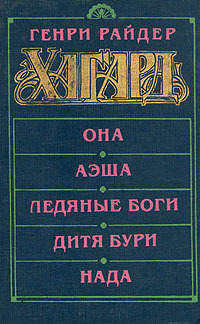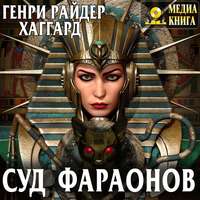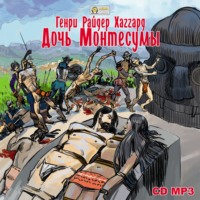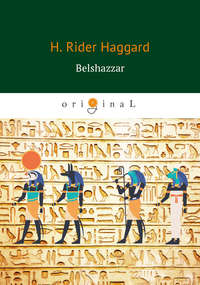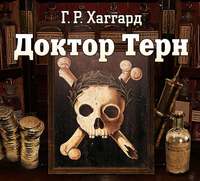
Полная версия
She: A History of Adventure
“So he killed himself,” I exclaimed. “I thought so.”
“And now,” Leo went on, without replying, “enough of myself. What has to be said belongs to you who live, not to me, who am dead, and almost as much forgotten as though I had never been. Holly, my friend (to whom, if he will accept the trust, it is my intention to confide you), will have told you something of the extraordinary antiquity of your race. In the contents of this casket you will find sufficient to prove it. The strange legend that you will find inscribed by your remote ancestress upon the potsherd was communicated to me by my father on his deathbed, and took a strong hold in my imagination. When I was only nineteen years of age I determined, as, to his misfortune, did one of our ancestors about the time of Elizabeth, to investigate its truth. Into all that befell me I cannot enter now. But this I saw with my own eyes. On the coast of Africa, in a hitherto unexplored region, some distance to the north of where the Zambesi falls into the sea, there is a headland, at the extremity of which a peak towers up, shaped like the head of a negro, similar to that of which the writing speaks. I landed there, and learnt from a wandering native, who had been cast out by his people because of some crime which he had committed, that far inland are great mountains, shaped like cups, and caves surrounded by measureless swamps. I learnt also that the people there speak a dialect of Arabic, and are ruled over by a beautiful white woman who is seldom seen by them, but who is reported to have power over all things living and dead. Two days after I had ascertained this the man died of fever contracted in crossing the swamps, and I was forced by want of provisions and by symptoms of an illness which afterwards prostrated me to take to my dhow again.
“Of the adventures that befell me after this I need not now speak. I was wrecked upon the coast of Madagascar, and rescued some months afterwards by an English ship that brought me to Aden, whence I started for England, intending to prosecute my search as soon as I had made sufficient preparations. On my way I stopped in Greece, and there, for ‘Omnia vin-cit amor,’ I met your beloved mother, and married her, and there you were born and she died. Then it was that my last illness seized me, and I returned hither to die. But still I hoped against hope, and set myself to work to learn Arabic, with the intention, should I ever get better, of returning to the coast of Africa, and solving the mystery of which the tradition has lived so many centuries in our family. But I have not got better, and, so far as I am concerned, the story is at an end.
“For you, however, my son, it is not at an end, and to you I hand on these the results of my labour, together with the hereditary proofs of its origin. It is my intention to provide that they shall not be put into your hands until you have reached an age when you will be able to judge for yourself whether or no you will choose to investigate what, if it is true, must be the greatest mystery in the world, or to put it by as an idle fable, originating in the first place in a woman’s disordered brain.
“I do not believe that it is a fable; I believe that if it can only be re-discovered there is a spot where the vital forces of the world visibly exist. Life exists; why therefore should not the means of preserving it indefinitely exist also? But I have no wish to prejudice your mind about the matter. Read and judge for yourself. If you are inclined to undertake the search, I have so provided that you will not lack for means. If, on the other hand, you are satisfied that the whole thing is a chimera, then, I adjure you, destroy the potsherd and the writings, and let a cause of troubling be removed from our race for ever. Perhaps that will be wisest. The unknown is generally taken to be terrible, not as the proverb would infer, from the inherent superstition of man, but because it so often is terrible. He who would tamper with the vast and secret forces that animate the world may well fall a victim to them. And if the end were attained, if at last you emerged from the trial ever beautiful and ever young, defying time and evil, and lifted above the natural decay of flesh and intellect, who shall say that the awesome change would prove a happy one? Choose, my son, and may the Power who rules all things, and who says ‘thus far shalt thou go, and thus much shalt thou learn,’ direct the choice to your own happiness and the happiness of the world, which, in the event of your success, you would one day certainly rule by the pure force of accumulated experience. – Farewell!”
Thus the letter, which was unsigned and undated, abruptly ended.
“What do you make of that, Uncle Holly,” said Leo, with a sort of gasp, as he replaced it on the table. “We have been looking for a mystery, and we certainly seem to have found one.”
“What do I make of it? Why, that your poor dear father was off his head, of course,” I answered, testily. “I guessed as much that night, twenty years ago, when he came into my room. You see he evidently hurried his own end, poor man. It is absolute balderdash.”
“That’s it, sir!” said Job, solemnly. Job was a most matter-offact specimen of a matter-of-fact class.
“Well, let’s see what the potsherd has to say, at any rate,” said Leo, taking up the translation in his father’s writing, and commencing to read:
– “I, Amenartas, of the Royal House of the Pharaohs of Egypt, wife of Kallikrates (the Beautiful in Strength), a Priest of Isis whom the gods cherish and the demons obey, being about to die, to my little son Tisis-thenes (the Mighty Avenger). I fled with thy father from Egypt in the days of Nectanebes,[4] causing him through love to break the vows that he had vowed. We fled southward, across the waters, and we wandered for twice twelve moons on the coast of Libya (Africa) that looks towards the rising sun, where by a river is a great rock carven like the head of an Ethiopian. Four days on the water from the mouth of a mighty river were we cast away, and some were drowned and some died of sickness. But us wild men took through wastes and marshes, where the sea fowl hid the sky, bearing us ten days’ journey till we came to a hollow mountain, where a great city had been and fallen, and where there are caves of which no man hath seen the end; and they brought us to the Queen of the people who place pots upon the heads of strangers, who is a magician having a knowledge of all things, and life and loveliness that does not die. And she cast eyes of love upon thy father, Kal-likrates, and would have slain me, and taken him to husband, but he loved me and feared her, and would not. Then did she take us, and lead us by terrible ways, by means of dark magic, to where the great pit is, in the mouth of which the old philosopher lay dead, and showed to us the rolling Pillar of Life that dies not, whereof the voice is as the voice of thunder; and she did stand in the flames, and come forth unharmed, and yet more beautiful. Then did she swear to make thy father undying even as she is, if he would but slay me, and give himself to her, for me she could not slay because of the magic of my own people that I have, and that prevailed thus far against her. And he held his hand before his eyes to hide her beauty, and would not. Then in her rage did she smite him by her magic, and he died; but she wept over him, and bore him thence with lamentations: and being afraid, me she sent to the mouth of the great river where the ships come, and I was carried far away on the ships where I gave thee birth, and hither to Athens I came at last after many wanderings. Now I say to thee, my son, Tisisthenes, seek out the woman, and learn the secret of Life, and if thou mayest find a way slay her, because of thy father Kallikrates; and if thou dost fear or fail, this I say to all thy seed who come after thee, till at last a brave man be found among them who shall bathe in the fire and sit in the place of the Pharaohs. I speak of those things, that though they be past belief, yet I have known, and I lie not.”
“May the Lord forgive her for that,” groaned Job, who had been listening to this marvellous composition with his mouth open.
As for myself, I said nothing: my first idea being that my poor friend, being demented, had composed the whole thing, though it scarcely seemed likely that such a story could have been invented by anybody. It was too original. To solve my doubts I took up the potsherd and began to read the close uncial Greek writing on it; and very good Greek of the period it is, considering that it came from the pen of an Egyptian born. Here is an exact transcript of it: – ΑΜΕΝΑΡΤΑΣΤΟΥΒΑΣΙΛΙΚΟΥΓΕΝΟΥΣΤΟΥΑΙΓΥΠΤΙΟ
ΥΗΤΟΥΚΑΛΛΙΚΡΑΤΟΥΣΙΣΙΔΟΣΙΕΡΕΩΣΗΝΟ ΙΜΕΝΘΕΟ ΙΤΡΕΦΟΥΣΙΤΑΔΕΔΑΙΜΟΝΙΑΥΠΟΤΑΣΣΕΤΑΙΗΔΗΤΕΛΕΥ ΤΩΣΑΤΙΣΙΣΘΕΝΕΙΤΩΠΑΙΔΙΕΠ ΙΣΤΕΛΛΕΙΤΑΔΕΣΥΝΕΦΥ ΓΟΝΓΑΡΠΟΤΕΕΚΤΗΣΑΙΓΥΠΤΙΑΣΕΠΙΝΕΚΤΑΝΕΒΟΥΜΕ ΤΑΤΟΥΣΟΥΠΑΤΡΟ ΣΔΙΑΤΟΝΕΡΩΤΑΤΟΝΕΜΟΝΕΠΙΟΡΚ ΗΣΑΝΤΟΣΦΥΓΟΝΤΕΣΔΕΠΡΟΣΝΟΤΟΝΔΙΑΠΟΝΤΙΟΙΚΑ ΙΚΔΜΗΝΑ ΣΚΑΤΑΤΑΠΑΡΑΘΑΛΑΣΣΙΑΤΗΣΛΙΒΥΗΣΤΑΠΡ ΟΣΗΛΙΟΥΑΝΑΤΟΛΑΣΠΛΑΝΗΘΕΝΤΕΣΕΝΘΑΠΕΡΠΕΤΡΑ ΤΙΣΜΕΓΑΛΗΓΛΥΠΤΟΝΟΜΟΙΩΜΑΑΙΘΙΟΠΟΣΚΕΦΑΛΗΣ ΕΙΤΑΗΜΕΡΑΣΔΑΠΟΣΤΟΜΑΤΟΣΠΟΤΑΜΟΥΜΕΓ ΑΛΟΥΕ ΚΠΕΣΟΝΤΕΣΟΙΜΕΝΚΑΤΕΠΟΝΤΙΣΘΗΜΕΝΟΙΔΕΝΟΣΩΙ ΑΠΕΘΑΝΟΜΕΝΤΕΛΟΣΔΕΥΠΑΓΡΙΩΝΑΝ ΘΡΩΠΩΝΕΦΕΡ ΟΜΕΘΑΔΙΑΕΛΕΩΝΤΕΚΑΙΤΕΝΑΓΕΩΝΕΝΘΑΠΕΡΠΤΗΝΩ ΝΠΛΗΘΟΣΑΠΟΚΡΥΠΤΕΙΤΟΝΟΥ ΡΑΝΟΝΗΜΕΡΑΣΙΕΩΣ ΗΛΘΟΜΕΝΕΙΣΚΟΙΛΟΝΤΙΟΡΟΣΕΝΘΑΠΟΤΕΜΕΓΑΛΗΜ ΕΝΠΟΛΙΣΗΝΑΝΤΡΑΔΕΑΠ ΕΙΡΟΝΑΗΓΑΓΟΝΔΕΩΣΒΑΣΙ ΛΕΙΑΝΤΗΝΤΩΝΞΕΝΟΥΣΧΥΤΡΑΙΣΣΤΕΦΑΝΟΥΝΤΩΝΗΤ ΙΣΜΑΓΕΙΑΜΕΝΕ ΧΡΗΤΟΕΠΙΣΤΗΜΗΔΕΠΑΝΤΩΝΚΑΙΔ ΗΚΑΙΚΑΛΛΟΣΚΑΙΡΩΜΗΝΑΓΗΡΩΣΗΝΗΔΕΚΑΛΛΙΚΡΑΤ ΟΥΣΤΟΥΣ ΟΥΠΑΤΡΟΣΕΡΑΣΘΕΙΣΑΤΟΜΕΝΠΡΩΤΟΝΣΥΝ ΟΙΚΕΙΝΕΒΟΥΛΕΤΟΕΜΕΔΕΑΝΕΛΕΙΝΕΠΕΙΤΑΩΣΟΥΚΑΝ ΕΠΕΙΘΕΝΕΜΕΓΑΡΥΠΕΡΕΦΙΛΕΙΚΑΙΤΗΝΞΕΝΗΝΕΦΟΒΕ ΙΤΟΑΠΗΓΑΓΕΝΗΜΑΣΥΠΟΜΑΓΕΙΑΣΚΑΘΟΔΟ ΥΣΣΦΑΛ ΕΡΑΣΕΝΘΑΤΟΒΑΡΑΘΡΟΝΤΟΜΕΓΑΟΥΚΑΤΑΣΤΟΜΑΕΚΕ ΙΤΟΟΓΕΡΩΝΟΦΙΛΟΣΟΦΟΣΤΕΘΝΕΩΣ ΑΦΙΚΟΜΕΝΟΙΣΔ ΕΔΕΙΞΕΦΩΣΤΟΥΒΙΟΥΕΥΘΥΟΙΟΝΚΙΟΝΑΕΛΙΣΣΟΜΕΝΟ ΝΦΩΝΗΝΙΕΝΤΑΚΑΘΑΠΕΡΒ ΡΟΝΤΗΣΕΙΤΑΔΙΑΠΥΡΟΣΒ ΕΒΗΚΥΙΑΑΒΛΑΒΗΣΚΑΙΕΤΙΚΑΛΛΙΩΝΑΥΤΗΕΑΥΤΗΣΕΞΕ ΦΑΝΗΕΚΔΕΤΟΥ ΤΩΝΩΜΟΣΕΚΑΙΤΟΝΣΟΝΠΑΤΕΡΑΑΘΑ ΝΑΤΟΝΑΠΟΔΕΙΞΕΙΝΕΙΣΥΝΟΙΚΕΙΝΟΙΒΟΥΛΟΙΤΟΕΜΕΔ ΕΑΝΕ ΛΕΙΝΟΥΓΑΡΟΥΝΑΥΤΗΑΝΕΛΕΙΝΙΣΧΥΕΝΥΠΟΤΩΝ ΗΜΕΔΑΠΩΝΗΝΚΑΙΑΥΤΗΕΧΩΜΑΓΕΙΑΣΟΔΟΥΔΕΝΤ ΙΜ ΑΛΛΟΝΗΘΕΛΕΤΩΧΕΙΡΕΤΩΝΟΜΜΑΤΩΝΠΡΟΙΣΧΩΝΙΝΑ ΔΗΤΟΤΗΣΓΥΝΑΙΚΟΣΚΑΛΛΟΣΜΗΟΡΩΗΕΠΕ ΙΤΑΟΡΓΙΣ ΘΕΙΣΑΚΑΤΕΓΟΗΤΕΥΣΕΜΕΝΑΥΤΟΝΑΠΟΛΟΜΕΝΟΝΜΕ ΝΤΟΙΚΛΑΟΥΣΑΚΑΙΟΔΥΡΟΜΕΝΗΕΚ ΕΙΘΕΝΑΠΗΝΕΓΚΕ ΝΕΜΕΔΕΦΟΒΩΙΑΦΗΚΕΝΕΙΣΣΤΟΜΑΤΟΥΜΕΓΑΛΟΥΠΟΤΑΜΟΥΤΟΥΝΑΥΣΙΠΟΡΟΥΠΟ ΡΡΩΔΕΝΑΥΣΙΝΕΦΩΝΠΕ ΡΠΛΕΟΥΣΑΕΤΕΚΟΝΣΕΑΠΟΠΛΕΥΣΑΣΑΜΟΛΙΣΠΟΤΕΔΕ ΥΡΟΑΘΗΝΑΖΕΚΑΤΗΓ ΑΓΟΜΗΝΣΥΔΕΩΤΙΣΙΣΘΕΝΕΣΩΝ ΕΠΙΣΤΕΛΛΩΜΗΟΛΙΓΩΡΕΙΔΕΙΓΑΡΤΗΝΓΥΝΑΙΚΑΑΝΑΖΗ ΤΕΙΝΗΝΠ ΩΣΤΟΤΟΥΒΙΟΥΜΥΣΤΗΡΙΟΝΑΝΕΥΡΗΣΚΑΙΑ ΝΑΙΡΕΙΝΗΝΠΟΥΠΑΡΑΣΧΗΔΙΑΤΟΝΣΟΝΠΑΤΕΡΑΚΑΛΛΙ ΚΡΑΤΗΝΕΙΔΕΦΟΒΟΥΜΕΝΟΣΗΔΙΑΑΛΛΟΤΙΑΥΤΟΣΛΕΙΠ ΕΙΤΟΥΕΡΓΟΥΠΑΣΙΤΟΙΣΥΣΤΕΡΟΝΑΥΤΟΤΟ ΥΤΟΕΠΙΣΤΕ ΛΛΩΕΩΣΠΟΤΕΑΓΑΘΟΣΤΙΣΓΕΝΟΜΕΝΟΣΤΩΠΥΡΙΛΟΥΣΑ ΣΘΑΙΤΟΛΜΗΣΕΙΚΑΙΤΑΑΡΙΣΤ ΕΙΑΕΧΩΝΒΑΣΙΛΕΥΣΑΙΤΩ ΝΑΝΘΡΩΠΩΝΑΠΙΣΤΑΜΕΝΔΗΤΑΤΟΙΑΥΤΑΛΕΓΩΟΜΩΣΔ ΕΑΑΥΤΗΕΓΝΩΚΑΟ ΥΚΕΨΕΥΣΑΜΗΝ
The general convenience in reading, I have here accurately transcribed this inscription into the cursive character.
Ἀμενάρτας, τοῦ βασικοῦ γένους τοῦ Αἰγυπτίου, ἡ τοῦ Καλλικράτους Ἴσιδος ἱερέως, ἣν οἱ μὲν θεοὶ τρέφουσι τὰ δὲ δαιμονια ὑποτάσσεται, ἤδη τελευτῶσα Τισισθένει τῷ παιδὶ ἐπιστέλλει τάδε· συνέφυγον γάρ ποτε ἐκ τῆς Αἰγυπτίας ἐπὶ Νεκτανέβου μετὰ τοῦ σοῦ πατρός, διὰ τὸν ἔρωτα τὸν ἐμὸν ἐπιορκήσαντος. φυγόντες δὲ πρὸς νότον διαπόντιοι καὶ κʹδʹ μῆνας κατὰ τὰ παραθαλάσσια τῆς Αιβύης τὰ πρός ἡλίου ἀνατολὰς πλανηθέντες, ἔνθαπερ πέτρα τις μελάλη, γλυπτὸν ὁμοίωμα Αἰθίοπος κεφαλῆς, εἶτα ἡμέρας δʹ ἀπὸ στόματος ποταμοῦ μεγάλου ἐκπεσόντες, οἱ μέν κατεποντίσθημεν, οἱ δὲ νόσῳ ἀπεθάνομεν· τέλος δὲ ὑπ᾽ ἀλρίων ἀνθρώπων ἐφερόμεθα διὰ ἐλέων τε καὶ τεναλέων ἔνθαπερ πτηνῶν πλῆθος ἀποκρύπτει τὸν οὐρανὸν, ἡμέρας ί, ἕως ἤλθομεν εἰς κοῖλόν τι ὄρος, ἔνθα ποτὲ μεγάλη μὲν πόλις ἦν, ἄντρα δὲ ἀπείρονα· ἤγαγον δὲ ὡς βασίλειαν τὴν τῶν ξένους χύτραις στεφανούντων, ἥτις μαλεία μὲν ἐχρῆτο ἐπιστήμη δὲ πάντων καὶ δὴ καὶ κάλλός καὶ ῥώμην ἀλήρως ἦν· ἡ δὲ Καλλικράτους τοῦ πατρὸς ἐρασθεῖδα τὸ μὲν πρῶτον συνοικεῖν ἐβούλετο ἐμὲ δὲ ἀνελεῖν· ἔπειτα, ὡς οὐκ ἀνέπειθεν, ἐμὲ γὰρ ὑπερεφίλει καὶ τὴν ξένην ἐφοβεῖτο, ἀπήγαγεν ἡμᾶς ὑπὸ μαγείας καθʹ ὁδοὺς σφαλερὰς ἔνθα τὸ βάραθρον τὸ μέγα, οὗ κατὰ στόμα ἔκειτο ὁ γέρων ὁ φιλόσοφος τεθνεώς, ἀφικομένοις δʹ ἔδειξε φῶς τοῦ βίου εὐθύ, οἷον κίονα ἑλισσόμενον φώνην ἱέντα καθάπερ βροντῆς, εἶτα διὰ πυρὸς βεβηκυῖα ἀβλαβὴς καὶ ἔτι καλλίων αὐτὴ ἑαυτῆς ἐξεφάνη. ἐκ δὲ τούτων ὤμοσε καὶ τὸν σὸν πατέρα ἀθάνατον ἀποδείξειν, εἰ συνοικεῖν οἱ βούλοιτο ἐμὲ δε ὰνελεῖν, οὐ γὰρ οὖν αὐτὴ ἀνελεῖν ἴσχυεν ὑπὸ τῶν ἡμεδαπῶν ἣν καὶ αὐτὴ ἔχω μαγείας. ὁ δʹ οὐδέν τι μᾶλλον ἤθελε, τὼ χεῖρε τῶν ὀμμάτων προίσχων ἵνα δὴ τὸ τῆς γυναικὸς κάλλος μὴ ὁρῴη· ἔπειτα ὀργισθεῖσα κατεγοήτευσε μὲν αὐτόν, ἀπολόμενον μέντοι κλάουσα καὶ ὀδυρμένη ἐκεῖθεν ἀπήνεγκεν, ἐμὲ δὲ φόβῳ ἀφῆκεν εἰς στόμα τοῦ μεγάλου ποταμοῦ τοῦ ναυσιπόρου, πόδδω δὲ ναυσίν, ἐφʹ ὧνπερ πλέουσα ἔτεκόν σε, ἀποπλεύσασα μόλις ποτὲ δεῦρο Ἀθηνάζε κατηγαγόν. σὺ δέ, ὦ Τισίσθενες, ὧν ἐπιστέλλω μὴ ὀλιγώρει· δεῖ γὰρ τῆν γυναῖκα ἀναζητεῖν ἤν πως τῦ βίου μυστήριον ἀνεύρῃς, καὶ ἀναιρεῖν, ἤν που παρασχῇ, διὰ τὸν πατέρα Καλλικράτους. εἐ δὲ φοβούμενος ἢ διὰ ἄλλο τι αὐτὸς λείπει τοῦ ἔργου, πᾶσι τοῖς ὕστερον αὐτὸ τοῦτο ἐπιστέλλω, ἕως ποτὲ ἀγαθός τις γενόμενος τῷ πυρὶ λούσασθαι τολμήσει καὶ τὰ ἀριστεῖα ἔχων βασιλεῦσαι τῶν ἀνθρώπων· ἄπιστα μὲν δὴ τὰ τοιαῦτα λέγω, ὅμως δὲ ἃ αὐτὴ ἔγνωκα οὐκ ἐψευσάμην.
The English translation was, as I discovered on further investigation, and as the reader may easily see by comparison, both accurate and elegant.
Besides the uncial writing on the convex side of the sherd at the top, painted in dull red, on what had once been the lip of the amphora, was the cartouche already mentioned as being on the scarabaeus, which we had also found in the casket. The hieroglyphics or symbols, however, were reversed, just as though they had been pressed on wax. Whether this was the cartouche of the original Kallikrates,[5] or of some Prince or Pharaoh from whom his wife Amenartas was descended, I am not sure, nor can I tell if it was drawn upon the sherd at the same time that the uncial Greek was inscribed, or copied on more recently from the Scarab by some other member of the family. Nor was this all. At the foot of the writing, painted in the same dull red, was the faint outline of a somewhat rude drawing of the head and shoulders of a Sphinx wearing two feathers, symbols of majesty, which, though common enough upon the effigies of sacred bulls and gods, I have never before met with on a Sphinx.
Also on the right-hand side of this surface of the sherd, painted obliquely in red on the space not covered by the uncial characters, and signed in blue paint, was the following quaint inscription: –
IN EARTH AND SKIE AND SEA
STRANGE THYNGES THER BE.
HOC FECIT
DOROTHEA VINCEY.
Perfectly bewildered, I turned the relic over. It was covered from top to bottom with notes and signatures in Greek, Latin, and English. The first in uncial Greek was by Tisisthenes, the son to whom the writing was addressed. It was, “I could not go. Tisisthenes to his son, Kallikrates.” Here it is in fac-simile with its cursive equivalent: – ΟΥΚΑΝΔΥΝΑΙΜΗΝΠΟΡΕΥΕСΘΑΙΤΙСΙСΘΕΝΗС
ΚΑΛΛΙΚΡΑΤΕΙΤΩΙΠΑΙΔΙ
οὐκ ἂν δυναίμην πορεύεσθαι. Τισισθένης Καλλικράτει τῷ παιδί.
This Kallikrates (probably, in the Greek fashion, so named after his grandfather) evidently made some attempt to start on the quest, for his entry written in very faint and almost illegible uncial is, “I ceased from my going, the gods being against me. Kallikrates to his son.” Here it is also: –
ΤΩΝΘΕΩΝΑΝΤΙΣΤΑΝΤΩΝΕΠΑΥΣΑΜΗΝΤΗΣΠΟΡΕΙΑΣΑΛΛΙΚΡΑΤΗΣΤΩΙΠΑΙΔΙ
τῶν θεῶν ἀντιστάντων ἐπαυσάμην τῆς πορείας. Καλλικράτης τῷ παιδί.
Between these two ancient writings, the second of which was inscribed upside down and was so faint and worn that, had it not been for the transcript of it executed by Vincey, I should scarcely have been able to read it, since, owing to its having been written on that portion of the tile which had, in the course of ages, undergone the most handling, it was nearly rubbed out – was the bold, modern-looking signature of one Lionel Vincey, “Ætate sua 17,” which was written thereon, I think, by Leo’s grandfather. To the right of this were the initials “J. B. V.,” and below came a variety of Greek signatures, in uncial and cursive character, and what appeared to be some carelessly executed repetitions of the sentence τῷ παιδί (to my son), showing that the relic was religiously passed on from generation to generation.
The next legible thing after the Greek signatures was the word “Romae, A.U.C.,” showing that the family had now migrated to Rome. Unfortunately, however, with the exception of its termination (evi) the date of their settlement there is for ever lost, for just where it had been placed a piece of the potsherd is broken away.
Then followed twelve Latin signatures, jotted about here and there, wherever there was a space upon the tile suitable to their inscription. These signatures, with three exceptions only, ended with the name “Vindex” or “the Avenger,” which seems to have been adopted by the family after its migration to Rome as a kind of equivalent to the Greek “Tisisthenes,” which also means an avenger. Ultimately, as might be expected, this Latin cognomen of Vindex was transformed first into De Vincey, and then into the plain, modern Vincey. It is very curious to observe how the idea of revenge, inspired by an Egyptian who lived before the time of Christ, is thus, as it were, embalmed in an English family name.
A few of the Roman names inscribed upon the sherd I have actually since found mentioned in history and other records. They were, if I remember right,
MVSSIVS. VINDEX
SEX. VARIVS MARVLLVS
C. FVFIDIVS. C. F. VINDEX
and
LABERIA POMPEIANA. CONIVX. MACRINI. VINDICIS
this last being, of course, the name of a Roman lady.
The following list, however, comprises all the Latin names upon the sherd: –
C. CAECILIVS VINDEX
M. AIMILIVS VINDEX
SEX. VARIVS. MARVLLVS
Q. SOSIVS PRISCVS SENECIO VINDEX
L. VALERIVS COMINIVS VINDEX
SEX. OTACILIVS. M. F.
L. ATTIVS. VINDEX
MVSSIVS VINDEX
C. FVFIDIVS. C. F. VINDEX
LICINIVS FAVSTVS
LABERIA POMPEIANA CONIVX MACRINI VINDICIS
MANILIA LVCILLA CONIVX MARVLLI VINDICIS
After the Roman names there is evidently a gap of very many centuries. Nobody will ever know now what was the history of the relic during those dark ages, or how it came to have been preserved in the family. My poor friend Vincey had, it will be remembered, told me that his Roman ancestors finally settled in Lombardy, and when Charlemagne invaded it, returned with him across the Alps, and made their home in Brittany, whence they crossed to England in the reign of Edward the Confessor. How he knew this I am not aware, for there is no reference to Lombardy or Charlemagne upon the tile, though, as will presently be seen, there is a reference to Brittany. To continue: the next entries on the sherd, if I may except a long splash either of blood or red colouring matter of some sort, consist of two crosses drawn in red pigment, and probably representing Crusaders’ swords, and a rather neat monogram (“D. V.”) in scarlet and blue, perhaps executed by that same Dorothea Vincey who wrote, or rather painted, the doggrel couplet. To the left of this, inscribed in faint blue, were the initials A. V., and after them a date, 1800.
Then came what was perhaps as curious an entry as anything upon this extraordinary relic of the past. It is executed in black letter, written over the crosses or Crusaders’ swords, and dated fourteen hundred and forty-five. As the best plan will be to allow it to speak for itself, I here give the black-letter fac-simile, together with the original Latin without the contractions, from which it will be seen that the writer was a fair mediaeval Latinist. Also we discovered what is still more curious, an English version of the black-letter Latin. This, also written in black letter, we found inscribed on a second parchment that was in the coffer, apparently somewhat older in date than that on which was inscribed the mediaeval Latin translation of the uncial Greek of which I shall speak presently. This I also give in full.
Fac-simile of Black-Letter Inscription on the Sherd of Amenartas.

“Ista reliquia est valde misticum et myrificum opus, quod majores mei ex Armorica, scilicet Britannia Minore, secum convehebant; et et quidam sanctus clericus semper patri meo in manu ferebat quod penitus illud destrueret, affirmans quod esset ab ipso Sathana conflatum prestigiosa et dyabolica arte, quare pater meus confregit illud in duas partes, quas quidem ego Johannes de Vinceto salvas servavi et adaptavi sicut appa-ret die lune proximo post festum beate Marie Virginis anni gratie MCCCCXLV.”
Fac-simile of the Old English Black-Letter Translation of the above Latin Inscription from the Sherd of Amenartas found inscribed upon a parchment.

“Thys rellike ys a ryghte mistycall worke and a marvaylous, ye whyche myne aunceteres aforetyme dyd conveigh hider with them from Armoryke which ys to seien Britaine ye Lesse and a certayne holye clerke should allweyes beare my fadir on honde that he owghte uttirly for to frusshe ye same, affyr-mynge that yt was fourmed and conflatyed of Sathanas hym selfe by arte magike and dyvellysshe wherefore my fadir dyd take ye same and tobrast yt yn tweyne, but I, John de Vincey, dyd save whool ye tweye partes therof and topeecyd them to-gydder agayne soe as yee se, on this daye mondaye next fol-lowynge after ye feeste of Seynte Marye ye Blessed Vyrgyne yn ye yeere of Salvacioun fowertene hundreth and fyve and fowerti.”
The next and, save one, last entry was Elizabethan, and dated 1564. “A most strange historie, and one that did cost my father his life; for in seekynge for the place upon the east coast of Africa, his pinnance was sunk by a Portuguese galleon off Lorenzo Marquez, and he himself perished. – John Vincey.”
Then came the last entry, apparently, to judge by the style of writing, made by some representative of the family in the middle of the eighteenth century. It was a misquotation of the well-known lines in Hamlet, and ran thus: “There are more things in Heaven and earth than are dreamt of in your philosophy, Horatio.”[6]
And now there remained but one more document to be examined – namely, the ancient black-letter transcription into mediaeval Latin of the uncial inscription on the sherd. As will be seen, this translation was executed and subscribed in the year 1495, by a certain “learned man,” Edmundus de Prato (Edmund Pratt) by name, licentiate in Canon Law, of Exeter College, Oxford, who had actually been a pupil of Grocyn, the first scholar who taught Greek in England. No doubt, on the fame of this new learning reaching his ears, the Vincey of the day, perhaps that same John de Vincey who years before had saved the relic from destruction and made the black-letter entry on the sherd in 1445, hurried off to Oxford to see if perchance it might avail to dissolve the secret of the mysterious inscription. Nor was he disappointed, for the learned Edmundus was equal to the task. Indeed his rendering is so excellent an example of mediaeval learning and latinity that, even at the risk of sating the learned reader with too many antiquities, I have made up my mind to give it in fac-simile, together with an expanded version for the benefit of those who find the contractions troublesome. The translation has several peculiarities on which this is not the place to dwell, but I would in passing call the attention of scholars to the passage “duxerunt autem nos ad reginam advenaslasanis-coronantium,” which strikes me as a delightful rendering of the original, “ἤγαγον δὲ ὡς βασίλειαν τὴν τῶν ξένους χύτραις στεφανούντων.”
mediaeval Black-Letter Latin Translation of the Uncial Inscription on the Sherd of Amenartas

Amenartas, e genere regio Egyptii, uxor Callicratis, sac-erdotis Isidis, quam dei fovent demonia attendunt, filiolo suo Tisistheni jam moribunda ita mandat: Effugi quodam ex Egypto, regnante Nectanebo, cum patre tuo, propter mei amorem pejerato. Fugientes autem versus Notum trans mare, et viginti quatuor menses per litora Libye versus Ori-entem errantes, ubi est petra quedam magna sculpta instar Ethiopis capitis, deinde dies quatuor ab ostio fluminis magni ejecti partim submersi sumus partim morbo mortui sumus: in fine autem a feris hominibus portabamur per paludes et vada, ubi avium multitudo celum obumbrat, dies decem, donec advenimus ad cavum quendam montem, ubi olim magna urbs erat, caverne quoque immense; duxerunt autem nos ad reginam Advenaslasaniscoronantium, que magicâ utebatur et peritiá omnium rerum, et saltem pul-critudine et vigore insenescibilis erat. Hec magno patris tui amore perculsa, primum quidem ei connubium michi mortem parabat; postea vero, recusante Callicrate, amore mei et timore regine affecto, nos per magicam abduxit per vias horribiles ubi est puteus ille profundus, cujus juxta aditum jacebat senioris philosophi cadaver, et advenientibus mons-travit flammam Vite erectam, instar columne voluntantis, voces emittentem quasi tonitrus: tunc per ignem impetu nocivo expers transiit et jam ipsa sese formosior visa est.



